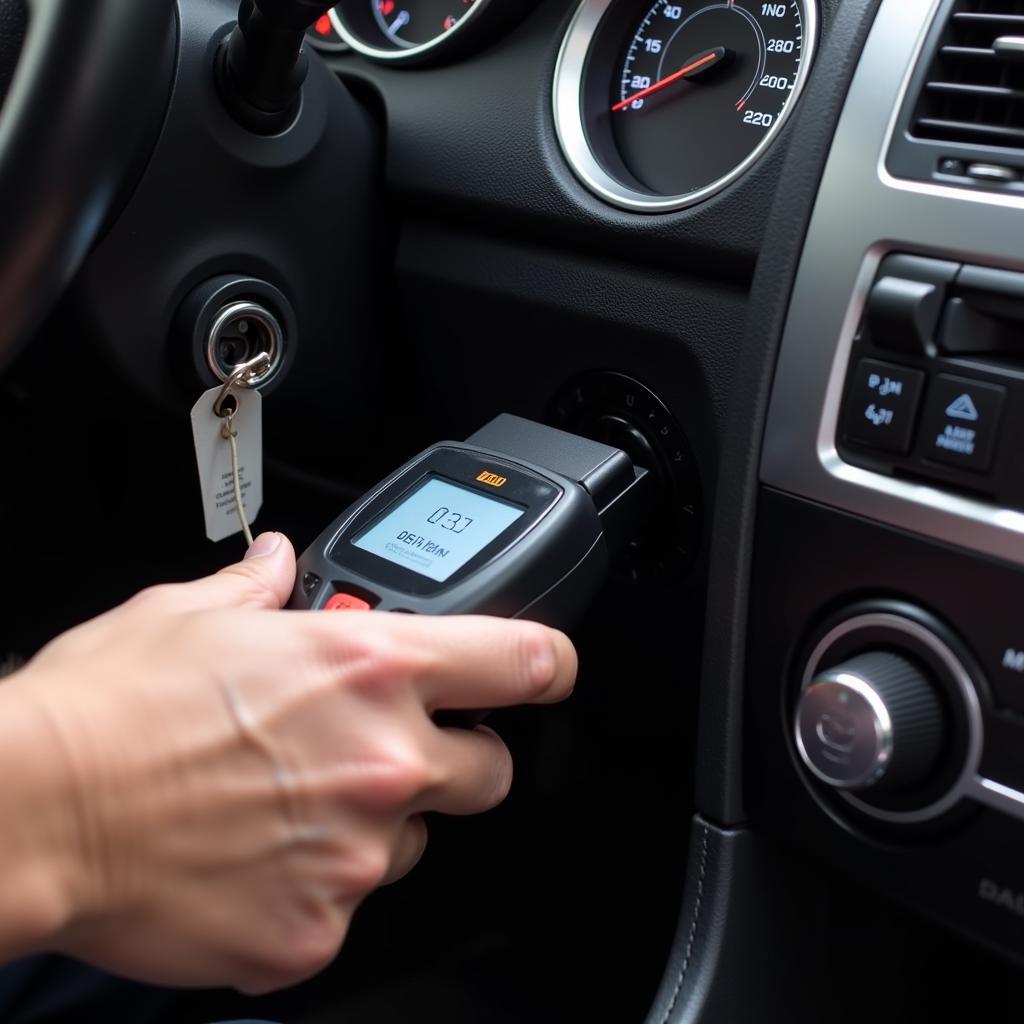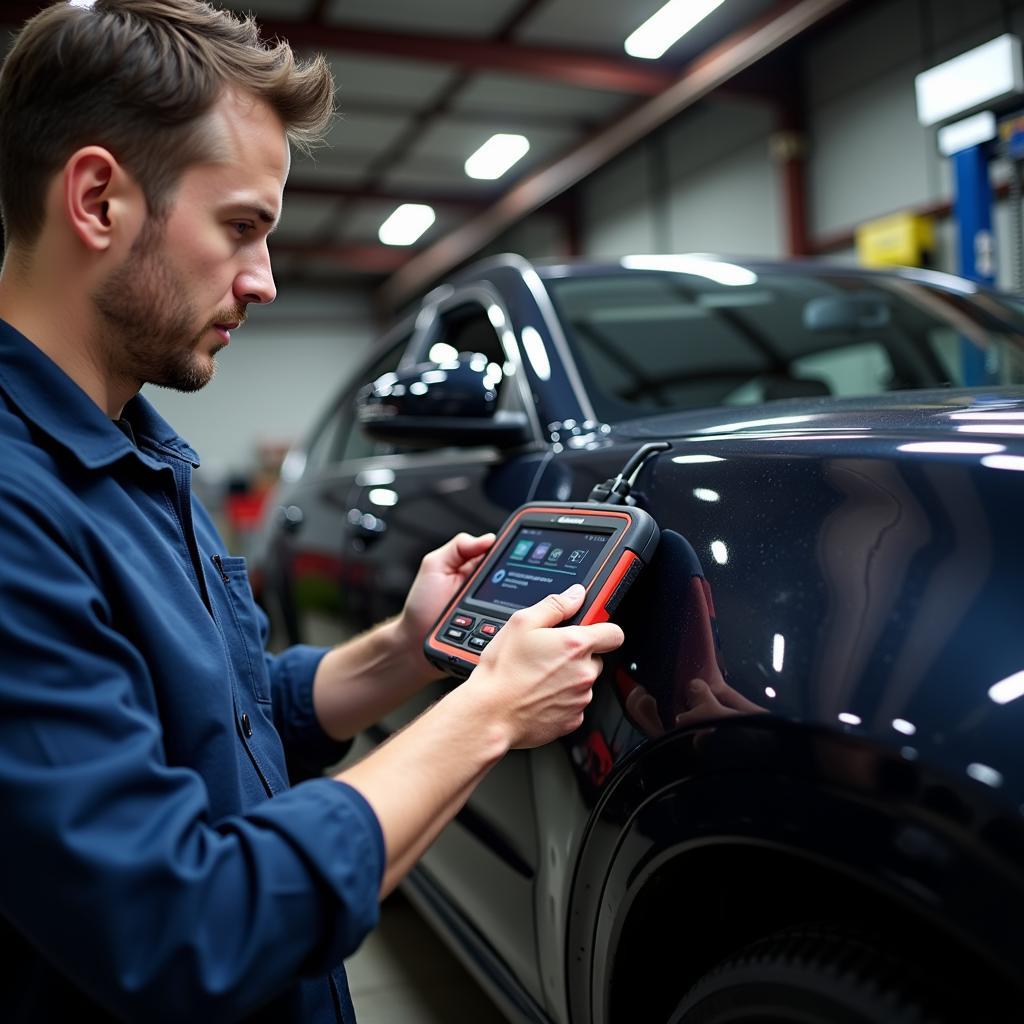The modern car is a marvel of engineering, a complex network of mechanical and electronic systems working in harmony. At the heart of this symphony lies the Engine Control Unit (ECU), the brain that manages everything from fuel injection to emissions control. To diagnose and repair issues within this intricate system, mechanics and car enthusiasts alike rely on an essential piece of equipment: the Automatic Car Diagnostic Tool.
 Mechanic Connecting Automatic Car Diagnostic Tool
Mechanic Connecting Automatic Car Diagnostic Tool
What is an Automatic Car Diagnostic Tool?
An automatic car diagnostic tool, also known as an OBD-II scanner or code reader, is a device that connects to a vehicle’s ECU to retrieve diagnostic information. This information comes in the form of Diagnostic Trouble Codes (DTCs), standardized codes that indicate specific areas of concern within the vehicle’s systems.
These tools have become indispensable for anyone involved in car maintenance and repair, from professional mechanics in bustling workshops to DIY enthusiasts tinkering in their garages. The ability to quickly and accurately pinpoint issues saves time and money, making these tools invaluable assets.
How Does an Automatic Car Diagnostic Tool Work?
The magic of the automatic car diagnostic tool lies in its ability to communicate with the vehicle’s ECU. This communication happens through the OBD-II port, a standardized 16-pin connector typically located under the dashboard on the driver’s side.
Once connected, the diagnostic tool sends requests to the ECU, prompting it to reveal any stored DTCs. These codes are like puzzle pieces, providing clues about potential malfunctions within the engine, transmission, emissions system, and other vital components.
Types of Automatic Car Diagnostic Tools
The market offers a wide range of automatic car diagnostic tools, each catering to different levels of expertise and budgetary constraints. Here’s a quick breakdown:
- Basic Code Readers: These entry-level devices primarily focus on reading and clearing DTCs. They’re ideal for car owners who want to understand basic engine warning lights or perform simple diagnostics.
- Mid-Range Scanners: These tools offer more advanced features, including live data streaming, which allows users to monitor real-time sensor readings. This is particularly useful for diagnosing intermittent problems or tracking down specific sensor malfunctions.
- Professional-Grade Scanners: These top-tier tools are the workhorses of professional mechanics. They offer comprehensive functionality, including advanced coding and programming capabilities, bi-directional control over vehicle systems, and access to manufacturer-specific data.
Benefits of Using an Automatic Car Diagnostic Tool
The benefits of incorporating an automatic car diagnostic tool into your automotive toolkit are numerous:
- Faster Diagnostics: By retrieving DTCs directly from the vehicle’s ECU, mechanics and car owners can swiftly identify the root cause of problems, eliminating guesswork and saving valuable time.
- Accurate Repairs: Accurate diagnostics lead to precise repairs, reducing the risk of unnecessary part replacements and ensuring that the issue is addressed effectively the first time.
- Cost Savings: By pinpointing problems early on, these tools can prevent minor issues from escalating into major repairs, saving car owners significant expenses in the long run.
- Increased Vehicle Lifespan: Regular diagnostics with these tools can help identify potential problems before they cause significant damage, ultimately extending the lifespan of the vehicle.
- Enhanced DIY Capabilities: These tools empower car enthusiasts to take control of their vehicle’s maintenance, allowing them to perform basic diagnostics and repairs independently.
Choosing the Right Automatic Car Diagnostic Tool
Selecting the appropriate automatic car diagnostic tool depends on individual needs and intended use.
For the average car owner: A basic code reader or a mid-range scanner offering live data streaming might suffice. Car diagnostic software for PC can provide a more affordable option with a range of features.
For DIY enthusiasts: Opt for a mid-range scanner with advanced features like live data graphing and the ability to access multiple vehicle modules.
Professional mechanics: Require the comprehensive functionality of a professional-grade scanner with advanced coding, programming, and bi-directional control capabilities.
 Professional Mechanic Using Car Diagnostic Tool
Professional Mechanic Using Car Diagnostic Tool
The Future of Automatic Car Diagnostic Tools
As vehicles become increasingly sophisticated, so too will the tools used to diagnose and repair them. The future of automatic car diagnostic tools will likely involve:
- Cloud-Based Diagnostics: Cloud connectivity will enable remote diagnostics and software updates, making it easier for mechanics and car owners to access expert support and the latest diagnostic information.
- Predictive Analytics: By analyzing data from various vehicle sensors, these tools will be able to predict potential problems before they occur, enabling proactive maintenance and preventing costly breakdowns.
- Augmented Reality Integration: Imagine using augmented reality glasses to overlay diagnostic information onto a live view of the engine bay, providing mechanics with real-time guidance during repairs.
Conclusion
The automatic car diagnostic tool is an indispensable tool in the ever-evolving landscape of automotive technology. From basic code readers to sophisticated professional-grade scanners, these devices empower car owners, DIY enthusiasts, and professional mechanics alike to diagnose and repair vehicles with greater speed, accuracy, and efficiency. As technology continues to advance, we can expect even more powerful and intuitive diagnostic tools to emerge, further revolutionizing the way we interact with and maintain our vehicles.
FAQs
Q: Are automatic car diagnostic tools compatible with all car makes and models?
A: Most modern vehicles (manufactured after 1996) are equipped with the standardized OBD-II port, making them compatible with a wide range of diagnostic tools. However, some manufacturer-specific protocols may require specialized tools.
Q: Can I use an automatic car diagnostic tool to clear my check engine light?
A: Yes, most automatic car diagnostic tools allow you to clear DTCs and reset the check engine light. However, it’s important to address the underlying issue that triggered the warning light in the first place.
Q: Do I need to be a mechanic to use an automatic car diagnostic tool effectively?
A: Basic code readers are relatively user-friendly and can be operated by car owners with minimal technical knowledge. However, more advanced features like live data streaming and bi-directional control require a deeper understanding of automotive systems.
Q: Can I use a smartphone app as a car diagnostic tool?
A: Yes, there are smartphone apps available that can connect to your vehicle’s OBD-II port via a Bluetooth adapter. However, the functionality and accuracy of these apps can vary significantly, so it’s essential to choose a reputable option.
Common Car Diagnostic Tool Questions
Q: My car diagnostic tool is showing a “Pending Code.” What does that mean?
A: A pending code indicates that a potential issue has been detected, but the ECU hasn’t yet confirmed it as a persistent problem. The code may clear itself if the issue doesn’t reoccur.
Q: I fixed the problem that triggered the check engine light, but the code won’t clear. What should I do?
A: In some cases, the ECU may require several driving cycles to clear a code after a repair has been made. If the code persists, double-check your repair to ensure it was performed correctly.
Q: Can a car diagnostic tool tell me when my next oil change is due?
A: While some advanced scanners can access manufacturer-specific service reminders, most diagnostic tools don’t track regular maintenance intervals like oil changes.
Need More Help?
For more information on car diagnostic tools, including in-depth reviews, comparisons, and buying guides, explore the wealth of resources available on DiagFixPro. We offer expert insights to help you make informed decisions about your vehicle’s maintenance and repair. Contact our 24/7 customer support team via WhatsApp: +1(641)206-8880, or Email: [email protected] if you need personalized assistance.

Leave a Reply